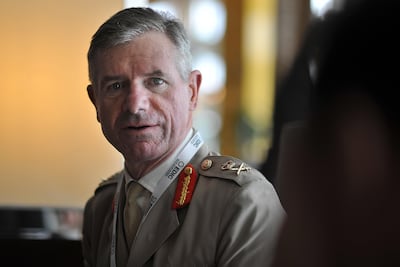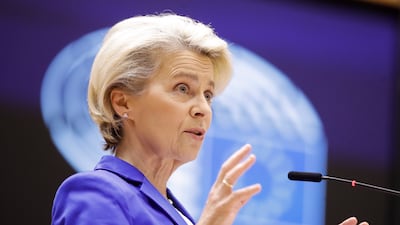The ripples of global dysfunction and unease from Russia’s invasion of Ukraine have swept into the Middle East, presenting new and difficult challenges. That means there will be particular focus and relevance to this year’s Manama Dialogue, which starts next Friday.
“The question is, if there wasn't a Manama Dialogue, would the problems be worse and I suspect some of them would be,” said Gen Sir Tom Beckett, the executive director for International Institute for Strategic Studies, Middle East.
“It's more a question of would the problems be worse, and I think they will be.”
The dialogue's standing is such that European Commission President Ursula van der Leyen will deliver the keynote address and The National understands that British Foreign Secretary James Cleverly will also attend.
The Manama Dialogue was started in 2004 as a way to get defence and foreign ministers and others to discuss Middle East security issues.
It has grown into the “pre-eminent and most important foreign policy, defence and security forum in the Middle East”, said Sir Tom, arguing that “most of the regional countries would agree with that”.
Key to Manama was being a place “where difficult things can be expressed” and building an atmosphere where politicians are willing to be candid in the name of progress.
“I achieved more in one weekend of bilats than I would in six months of travel,” former British defence secretary Philip Hammond said at the end of one Manama Dialogue.
The ability of the forum to unite people who might not normally wish to share the same room is significant to resolving problems in the Middle East.
“It's influential because when you see the people who want to speak, it's not just about politicians getting on a stage and talking — it's about politicians coming to a place where they know they're going to have their stance heard,” the London think tank’s executive said.

Its lofty rationale, which is becoming more important in an increasingly fractious world, is “to promote international peace and security” through rigorous examination of their positions.
“It allows ministers and very senior policymakers to express their nation's policies for the region in a public forum and all we ask them is to be prepared to take questions from difficult customers such as journalists,” said the UK’s former defence senior adviser for the Middle East.
“It doesn't do much for defending against Iran but it does do a lot for understanding the region [and] the issues better,” he added.
It is also the intense networking that makes the dialogue so important in addressing issues. There are possibly hundreds of informal Manama country-to-country bilaterals that Sir Tom said he never hears about but which politicians such as Philip Hammond appear to be highly satisfied with.
“It’s the secondary purpose,” he said, speaking from Bahrain. “We have observed countries that have difficult relations managing to have bilaterals in the margins.
“Whilst they may not solve all their problems, we're providing them a space to better understand each other and an opportunity to discuss solutions.”
An example of the dialogue’s influence in resolving regional conflicts is that both the foreign ministers from Azerbaijan and Armenia are expected to attend and no doubt have one of those quiet “bilats” to discuss Nagorno-Karabakh.
There will also be a plenary on Middle East initiatives for regional conflict resolution with everyone on the board an Arab, barring a single Norwegian, “because they've always been involved in mediate regional mediation”.
The talks, attended by the foreign ministers of Iraq and Yemen, will discuss Syria as well as “how Yemen gets going and with the end of the ceasefire”.
Despite the internal dissent, the threat from Tehran still hangs over the Gulf and the dialogue is a key forum to consider how the region wants to “de-escalate and defend from Iran and its capabilities”.
This can be done “collectively within the GCC” and with co-operation from the US and perhaps Israel, said Sir Tom.
The key point, he added, was that frank discussions can “expose the weaknesses on this side of the Arabian Gulf” that could allow countries to better defend themselves.
Russia’s invasion of Ukraine was not only a challenge to the international rules based order but it presented diplomatic and strategic problems for the region as a time when the Gulf states have been “diversifying their strategic relationships”.
While Washington's focus might appear to be elsewhere, it is still the region’s “security guarantor”, even if the perception was that they were “drawing back”, Sir Tom said. That guarantee will be underlined by the senior American figures who will attend the dialogue.
But Sir Tom believed that the dialogue would demonstrated that the new reality was that the region was diversifying its relationship and “standing on its own two feet”.


